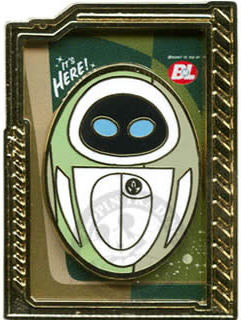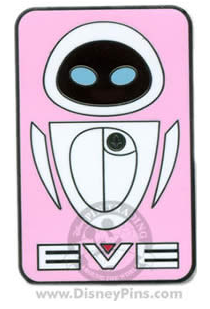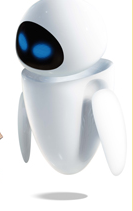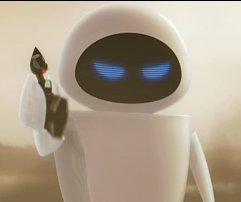eve
Quite predictably, I am in love with a robot.
I watched “Wall-E” yesterday and the movie was pretty much all that I hoped for.
But besides eloquently illustrating a sense of vast alienation, and the difficulty. fright, and outright terror provoked by trying to connect with another soul, and besides its obvious eco-friendly/anti-Wal-Mart agenda, it also utilizes some classic tropes of Western literature. I can imagine English majors having a field day with deconstructing this movie.
I blogged earlier about “Wall-E” before I had even seen the movie. But Ken Turan’s review pretty much hit a lot of the high points. In 2708 (give or take a few years), the Earth is inhabited only by cockroaches, and by sentient robots whose job is to take the gajillion metric tons of garbage that literally cover the entire surface of the earth, and compact it all so that it takes up a hell-of-a-lot less space.
Apparently, a distinctly Wal-Mart-like company called Buy-N-Large has managed to destroy Earth by sheer consumerism. There are trash heaps the size of the Empire State Building, and the air is perpetually brown and hazy, kind of like L.A. in the 1980s. So Buy-N-Large has this brilliant idea of sending everyone out into space, cruising around in Spaceship Titanic-like liners until the robots get the “waste management issue” under control.
Over the course of 700 years, though, it seems that there is only one functioning robot left, and his centuries of isolation have left him a little eccentric. From the googolplex number of pounds of trash he’s sifted through, he has managed to pick out a few geegaws and thingamajiggers that have piqued his fancy, including a Rubik’s cube, a spork, and quite possibly the last surviving plant on all of earth. And he has a thing for the musical “Hello, Dolly.”
Wall-E’s shy and clumsy courtship of Eve is really cute, no matter how trite and cliche it is. Still, going after a chick who has a high-frequency laser cannon—and isn’t shy about blowing things up with it—when you’re just a lowly trash compactor—well, that’s the stuff of fairy tales.
And either there is something seriously wrong with me, or Pixar did a really awesome job with getting me to care about the fate of two pieces of metal, plastic, and electronics. Nevermind that their fates happen to intersect with the fate of all of humanity. But when Wall-E finally gets to hold Eve’s hand, and remembers everything, it got me right there, you know?



The other scene that was predictably tear-jerking was when Eve is treated to a view of her own security cam (which was on during the time she was in stand-by mode, unconscious.) She sees Wall-E watching over her 24/7. never straying from her side, and she finally realizes what is important to her, and sometimes not even her Directive is as meaningful as caring about another entity.
And the way that she says, “No. No!” and it actually looks like she—a robot!—is about to cry, when Wall-E gets engulfed in an explosion and she thinks he’s been obliterated—that was really cute too.
And then the very beginning, when she gazes back at the spaceship that sent her, and when it’s gone, she starts having fun flying. That made my heart swell.



The eco-friendly, anti-consumerist agenda is pretty transparent, and if a kid can come out of that theater believing that having too much crap is a bad thing, then humanity may survive after all. The key sequence of this movie is when the Captain realizes that the plant is wilting and starting to wither. He gives the plant some water and it eventually starts to thrive. “All you needed was someone to take care of you.” Juxtaposed with his recent curiosity about Earth, he realizes what is manifestly necessary: Earth needs people to take care of it.
But the allusions to Genesis take the cake. There are a lot of ways to read it. The name Eve is obvious.
One way is to think of it as a perversely inverted form of Genesis. Wall-E and Eve—the creations of humanity—stumble upon the plant—an analog to the Tree of Knowledge of Good and Evil. In a reversal, it is Wall-E who offers Eve the plant, who, upon taking it, ends up being transported back to deep space, with Wall-E tagging along in the name of love. The finding and the taking of the plant result in the disturbance of the status quo—the knowledge that humanity learns is once again bittersweet—but this time, they are returning to Eden—the entirety of Earth itself.
From here, it is possible to read it as a subtle indictment of fundamentalist Christianity. Far from being the source of all sin, the plant, and the taking of the plant, frees humanity from a mechanized, barren Eden of consumerism. It is the guy following orders—Auto—who now plays the role of the serpent by insisting—first verbally, and then physically—that the Captain not partake of the Knowledge reserved to only the gods.
The film also gets its political digs in. The last Earth-bound CEO of Buy-n-Large utters the famous phrase “stay the course,” which is now bound to be remembered in the history books as W’s most singular moment of complete insanity, the tipping point from which American Greatness plummeted into the dark abyss of mediocrity.
And merely following orders without thinking for yourself ought to be criminal in of itself.
Overall, the movie was really enjoyable. I definitely want to watch it again.
